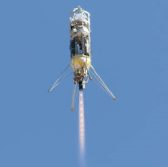 Masten Space Systems has completed an environmental monitoring experiment that carried multiple technologies onboard a company-built reusable rocket.
Masten Space Systems has completed an environmental monitoring experiment that carried multiple technologies onboard a company-built reusable rocket.
NASA said Thursday Masten Space Systems’ Xodiac rocket contained an electromagnetic field measurement experiment, called JANUS, from the Johns Hopkins University Applied Physics Laboratory.
The company is one of six firms that provide suborbital reusable launch vehicle flight and payload integration services to NASA under a $45 million contract awarded last year.
The agency said JANUS’ flight test was part of a push to foster routine integration and flight testing of future experiments and technology demonstrations.
NASA supports testing of such technology through the Flight Opportunities program that seeks to demonstrate combined flights in low-to-no microgravity environments.
“This initial flight is JHU APL’s first step into a new era of exploiting commercial suborbital low-cost access to space for scientific research and technology development,” said D. H. Todd Smith, JHUAPL senior scientist and JANUS principle investigator.
Joe Hernandez, campaign manager of NASA’s Flight Opportunities program, said collaborating with commercial flight providers and university researcher institutions can help the space agency advance new technology platforms.




